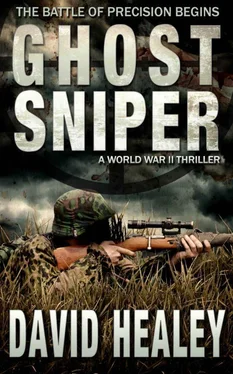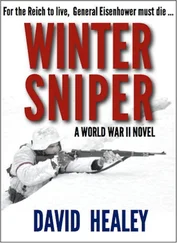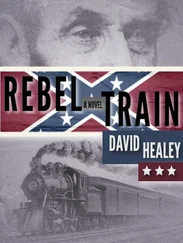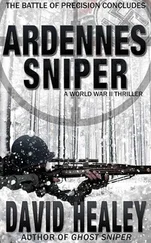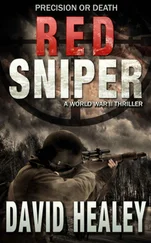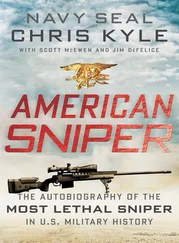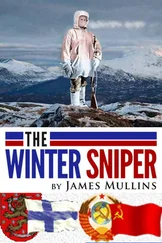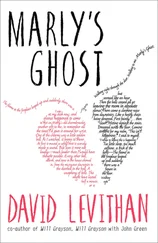The farm boy, Meacham, stopped, put his hands on his knees, and began to vomit.
“That poor chap has got it right,” the Brit said. “It’s bloody awful, is what it is.”
The next landmark they passed was the still-burning wreckage of the Sherman tank. From there, they moved cautiously, just in case the German sniper was still in residence. But the tower had been quiet since the Brit had fired the bazooka at it.
“I think you cooked that Kraut,” Vaccaro said.
“We’ll see.”
They moved on toward the church, spreading out and running one by one from shrubs or whatever cover presented itself. Still, there was no sign of life in the steeple. The bazooka blast, and before that the glancing shot from the Sherman, had done little visible damage to the church tower aside from stripping off the plaster veneer. The stone walls beneath still appeared sound. Built to last centuries, the steeple was indeed largely unscathed.
They crept cautiously toward the church itself, but there was still no sign of Germans.
“Cole and Vaccaro, go check it out,” the lieutenant said.
The two men approached the doorway, but paused just outside. “I wonder if there’s anybody still in there,” Cole said.
“We’ll just have to put the tip in and see how it feels,” Vaccaro suggested. “I know it always worked with my girlfriend.”
“Well, I ain’t your girlfriend, and thank God for that. You want to flip a coin?”
“Nah, I got this one.” With that, Vaccaro took a quick peek inside. “Nobody.”
Both men entered, soon followed by Mulholland and Meacham. The lieutenant started toward the stairs that led up into the tower, his .45 out and the sniper rifle slung over his shoulder. “Cole, you come with me. We’ll go take a look up top. The rest of you stay here. If there’s a German up there still, we don’t need him tossing down a grenade and wiping out the whole squad. He could do that even if he’s wounded.”
Peering up into the gloom of the stairway, Lieutenant Mulholland went up one step, and then another, making his way slowly.
Cole followed, his rifle at his shoulder, ready to fire. Gradually, ready at any moment for a German baton grenade to come bouncing down the steps or for a burst of gunfire from above, they wound their way up the stairs.
The view from the top of the bell tower was amazing. They could see the distant, deep blue of the English channel, and around them was spread the French countryside, the fields dotted with dirt lanes, meandering rivers and small villages. Everywhere they looked, American and Allied troopers were moving along the lanes or across the fields. It was the perfect defensive position—a sniper holed up in the steeple could do a great deal of damage until he was eventually brought down. But that wasn’t their purpose and the tower wasn’t much use to American troops.
Along with the view, they discovered that there were no Germans up here. Not even dead ones.
There were signs, however, that someone had been there recently. A gold-accented cigarette butt lay on the stone floor. Cole picked up one of several brass shell casings. He counted more than twenty spent shells, nearly each one representing an American GI who was now dead in the lane below. One of those rounds had killed Chief. Like the empty brass they had found in the sniper’s nest back at the hedgerow, this one had Cyrillic markings. The shots had been fired by a German with a Russian rifle. One who smoked fancy French cigarettes.
Cole held up the shell for the lieutenant’s inspection.
“I’ll be damned,” Lieutenant Mulholland said, once he had spotted the Russian markings. “It appears our sniper friend was at work up here.”
“Ain’t no friend of mine,” Cole said.
“I wouldn’t be so sure about that,” Mulholland said. “Look at this.”
The lieutenant pointed out where, in the wood railing of the belfry tower, the enemy sniper had used a sharp implement, perhaps the tip of a knife, to scratch something into the wood. It was a rough outline of a Confederate flag. Just like the one on Cole’s helmet.
“What the hell is that, Lieutenant? Some kind of message?”
“Hell, Cole, I don’t know what it means. Maybe he just wants to let you know he let you get away.”
Cole knew he must have been in the enemy sniper’s sights down on the road, and yet the man had spared him, shooting Chief instead. The German had his scope on Cole long enough to be able to study the Confederate flag on his helmet.
The thought made Cole’s flesh crawl. It was as if the German was saving him for later. Cole had done that himself once, hunting in the mountains. There was an old buck deer he had tracked for hours, and when he finally got him in his sights, Cole didn’t shoot. He admired the spread of the buck’s antlers, supported by a thick neck and powerful shoulders. A damn fine buck.
It wasn’t out of pity or remorse for the deer—Cole had no qualms about killing—but he knew that if he killed the buck, he wouldn’t be able to hunt it again. It was the kind of self indulgent decision a rich man might make—and it meant Cole had to settle for a couple of squirrels to fill the stew pot.
He’d never come across the buck again, and for all he knew, it was still out there, roaming the mountains back home. Sometimes, laying awake at night in his narrow Army bunk, with the sounds of snoring and farting men around him, Cole had thought about that old buck. He liked to imagine being alone in the cold mountain woods. It was a kind of waking dream you could have, going over that hunt again in your mind. Hunting him again was something Cole looked forward to. In some ways, he reckoned that buck had kept him from going crazy.
Cole hadn’t thought of war as hunting. It was different in his eyes. It was about staying alive as much as it was about killing. But what if this German sniper had made it through Russia—the worst kind of fighting, from everything Cole had heard—and now saw war the way Cole had seen that hunting trip? As a game? As a challenge? As a test of one’s skills?
A sniper like that had to be very good, very sure of himself. And very deadly. And now the wily son-of-a-bitch was hunting him.
• • •
Cole was born in 1920 near a placed called Gashey’s Knob. To call the Cole homestead a house would be a stretch of the imagination. It was a shack with tarpaper siding and rusty metal sheets for a roof. An old wood stove kept it more or less warm—mostly less, to tell the truth—in the winter. There was a front porch where dogs and pigs slept underneath, out of the rain. Sometimes Cole slept there to keep out of the way when his old man was on a bender. Normally, Cole crowded inside the cabin with four skinny younger brothers and sisters, and he went to bed hungry too many times to count.
His father made a kind of living as a trapper and bootlegger, but it wasn’t enough to keep the family fed, much less to buy twentieth century conveniences like electricity and indoor plumbing. If you needed to take a shit, you did it in the outhouse out back and wiped your ass with a page torn out of an old Sears Roebuck catalog.
Cole’s old man was mean as a rattlesnake and drunk half the time on his own moonshine, and it wasn’t until he got to the Army that he realized it wasn’t normal for your daddy to beat the hell out of you on a regular basis. For all his faults, Cole’s pa was also a skilled outdoorsman, what people would have called a mountain man in an earlier time. When he was sober, he taught Cole what he knew.
In the summer of 1933, times were hard all over the country, but they were petty much always hard in Gashey’s Knob. Cole was somewhere between a boy and a man, like he had one foot on each side of a stream and was wondering which way to step. He would always remember it as the Summer of the Bear, and it was one of his most painful memories.
Читать дальше
